Getting your GoDaddy-hosted website to appear on Google in the United Kingdom may seem daunting, but with some strategic search engine optimization (SEO), you can gain visibility and attract more British visitors.
The first key is on-page optimization – structuring your content, HTML tags and site architecture specifically for Google and users in the UK.
This includes doing keyword research to identify high-search, low-competition terms that are relevant for British audiences.
Some best practices for on-page SEO include:
- Optimizing page titles and meta descriptions – These appear as the title and snippet in search results and should contain your focus keywords.
- Adding alt text to images – Describes images for search engines and visually impaired users.
- Formatting content – Use heading tags (H1, H2, H3) to structure content and emphasize important keywords.
- Internal linking – Link relevant pages and content to spread “link juice” and authority around your site.
- Mobile optimization – Given Google’s mobile-first indexing, ensure site loads fast on phones.
Laying this on-page groundwork gives Google’s algorithms the signals they need to determine your site’s relevance for those all-important rankings in the lucrative UK market.
What is search engine optimization?
Search engine optimization (SEO) is the process of improving the quality and quantity of website traffic from search engines by optimizing websites, web pages, and content to rank higher in search engine results pages (SERPs).
SEO targets unpaid traffic rather than direct traffic or paid traffic.
The goal of SEO is to attract website visitors who will become customers, clients, or an audience that keeps coming back.
SEO involves keyword research, content creation and optimization, technical optimization, and link building.
But for this to happen, you MUST understand how search engines work to optimize websites for search engines.
The leading search engines, such as Google, Bing, and Yahoo, use crawlers to gather information about all the content they can find on the internet to populate their big databases.
SEO is essential for ensuring that the digital content you publish can be found and chosen by the public, increasing your website’s organic traffic.
Why would you care about your site showing on Google?
One word: marketing!
Showing up on Google is important because it can help increase traffic to your Godaddy website in the UK.
Google processes an average of 3 billion searches a day, and to provide relevant responses to all these queries, Google must continually find new websites to add to its search engine.
If your website is not visible to Google, it will not appear in search results, and potential visitors may not be able to find it.
Additionally, Google rewards websites that update frequently with fresh and relevant content, which can help improve your website’s search ranking.
Knowing what Google looks for when ranking websites can help you optimize your Godaddy website in the UK to improve its visibility and search ranking.
Tips for optimizing on-page SEO for Google in the UK
Optimizing your GoDaddy website’s on-page SEO factors specifically for Google UK is key for search visibility.
This includes code-level elements Google’s crawlers analyze as well as content presentation – how users in the UK will interact with each page.
Some best practices to remember:
Use UK-Focused Keywords
Conduct keyword research using Google’s Keyword Planner or tools like SEMrush to identify your site’s top ranking opportunities in the UK.
Look for high search volume but low competition long-tail keyword phrases popular with British audiences.
These may be more specific variations of general terms used globally.
Seed these organically into page copy.
Optimize Title Tags
Your <title> tags appear as the clickable links in search engines so must include target keywords. Format these for UK users e.g:
<title>Guide to the Best London Theatre Breaks | UK Theatre Holidays</title> Keep under 60 characters.
Meta Descriptions
Meta descriptions summarize page content in the search snippet. Optimized sample:
<meta name="description" content="Discover the top London theatre break packages. Find cheap hotels near the West End plus UK-wide theatre ticket and accommodation deals. Book your next British theatre holiday today!">Image Alt Text
All images should have descriptive alt text for search engine crawling and visually impaired users:
<img src="london-theatre.jpg" alt="London's West End Theatres with Big Ben in background">Use keywords where logically appropriate.
Content Structure
Break up text using subheadings H2, H3 tags around paragraphs discussing aspects of your topic. Embolden keywords in sentences where relevant.
Inner-Site Linking
Link different sections of your site together using anchor text keywords to spread authority:
Famous shows like [Les Miserables](/les-miserables-tickets) and [Wicked](/wicked-the-musical-tickets) have been London theatre staples for years.This on-page SEO checklist should help Google recognize your GoDaddy site’s value for UK searches and drive more British visitors from organic results. Monitor your ranking improvements in Google UK!
Best practices for off-page SEO and link building in the UK
Gaining off-page signals can significantly boost your GoDaddy website’s search rankings in Google UK.
This refers to other sites linking to your pages, which indicates relevance and authority to Google.
Some effective off-page SEO tactics include:
1. Guest Post Outreach
Reaching out to UK bloggers and site owners for guest contribution opportunities is extremely powerful, as earned guest posts retain editorial integrity in Google’s eyes versus paid links.
Identify sites that:
- Rank well in Google UK for your keywords
- Share a similar audience
- Accept guest writers
Craft niche-specific articles with natural links back to relevant pages on your site. Format guest posts for the site’s audience and guidelines.
For a theatre site you could pitch UK travel, hospitality, ticketing blogs etc.
2. Target Niche Directories
Sign up and fully complete industry-specific business listings related to your site’s focus. Theatre sites would benefit from comprehensive profiles on resources like:
- UK Theatres Directory
- London Theatre Direct
- BritEvents Entertainment Index
Ensure all data is consistent across directories to reinforce authority.
3. Engage Locally
- Comment on UK theatre blogs
- Join location-based Facebook Groups
- Sponsor local theatre events / productions
- Support regional theatre reviewer pages
This boosts brand presence on UK-focused sites. Interact genuinely over time without overt self-promotion.
4. Optimized LinkedIn Profile
As a authoritative business directory itself, ensure your LinkedIn company page is completely filled out.
Participate in UK theatre and tourism focused LinkedIn Groups to establish professional presence.
Use off-page SEO to align your GoDaddy site with trusted signal sources recognized by Google’s UK index. Monitor traction in organic rankings and clicks!
Step-by-step guide to submitting your site to Google Search Console
Submitting your website to Google Search Console is a vital step to getting indexed for searches in the UK.
Search Console provides insights on how Google crawls, indexes and ranks your pages – allowing you to optimize further.
Here is a step-by-step guide to add your GoDaddy site to Search Console in the UK:
Step 1 – Verify Site Ownership
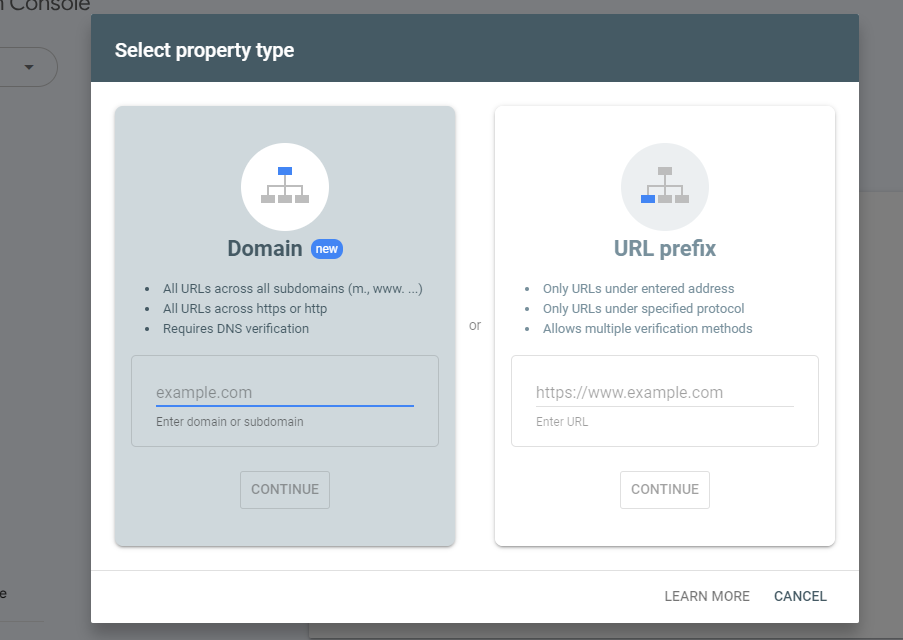
Google needs to confirm you “own” the site before providing data. There are a few methods to choose from:
HTML Tag
The best option for most sites. Simply add the meta tag Google provides to your root homepage code:
<meta name="google-site-verification" content="verification_token">Have GoDaddy confirm you are the account admin for the domain.
DNS Record
Add a TXT record provided by Google to your GoDaddy domain setup.
HTML File
Upload an html file to root folder.scattering ashes
Select the easiest verification method for your GoDaddy site from above.
Step 2 – Submit Sitemap
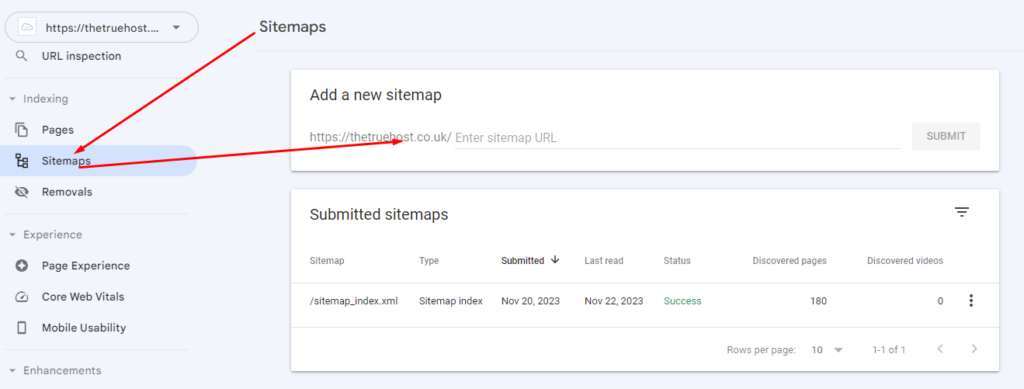
Your XML sitemap helps Google discover new and updated content quicker:
<sitemapindex>
<sitemap>
<loc>http://www.mysite.com/sitemap_page_1.xml</loc>
</sitemap>
</sitemapindex>Login to GoDaddy to generate a sitemap and submit this in Search Console.
Step 3 – Crawl Stats
Search Console provides crawl stats – how much of your site Google has discovered:
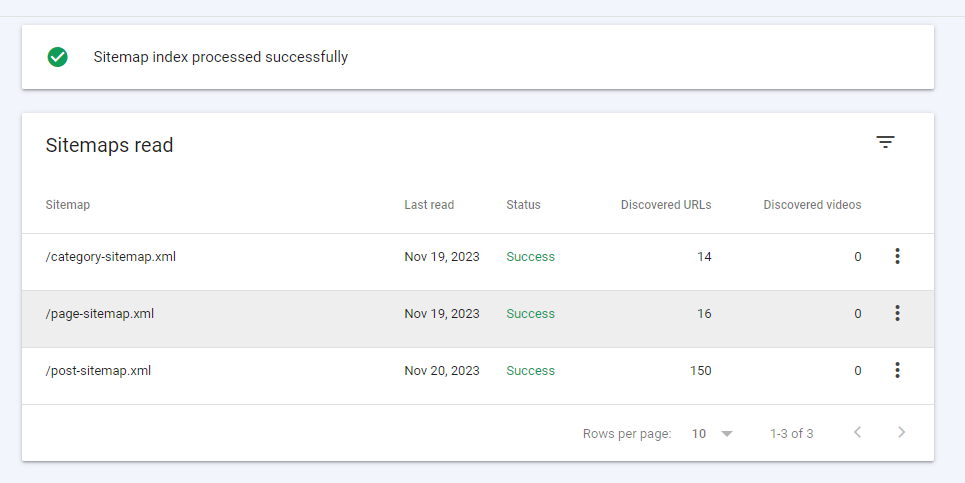
Check for crawl errors like broken pages or blocked sections.
Step 4 – Index Coverage
See how much of your site Google has included in their live search index:
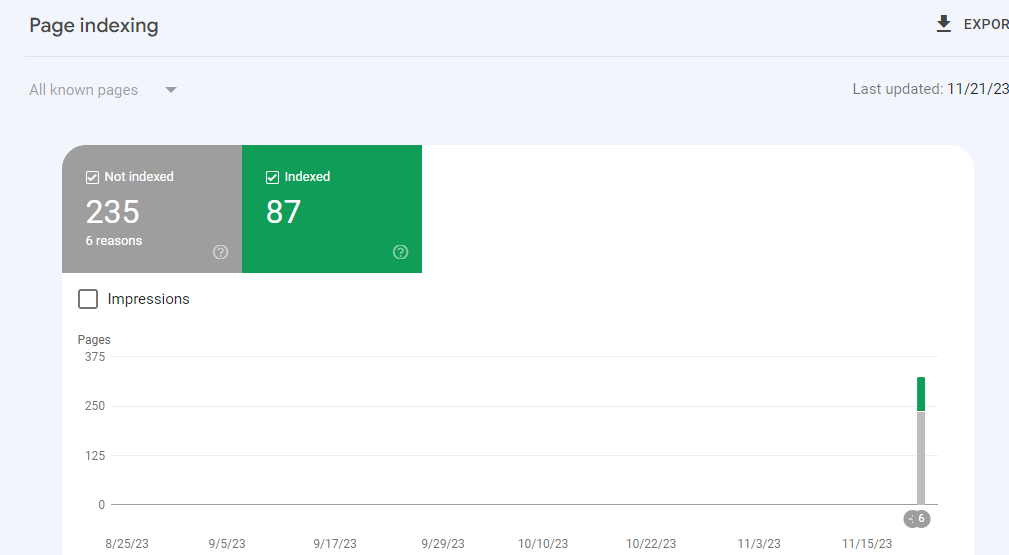
Compare to crawl stats to optimize inclusion.
Step 5 – Enhance Reporting
Add tracking code to site to unlock more data:
<!-- Global site tag (gtag.js) - Google Analytics -->
<script async src="https://www.googletagmanager.com/gtag/js?id=GA_MEASUREMENT_ID"></script>Get detailed info on queries, clicks, and eCPM revenue by connecting the Search Console to Google Analytics.
Monitor your GoDaddy site’s Google performance and fine-tune for the UK!
Additional tips for getting indexed faster in Google UK
Beyond core search engine optimization practices, additional strategies can further improve Google rankings and visibility for GoDaddy sites targeting the lucrative UK market:
Localize Content
Adapt your content for British readers, using region-specific references and spellings where applicable:
- Vocabulary/Slang – incorporate common UK terms over Americanisms
- Locations – reference cities like London, Manchester over NY, LA
- Events – highlight cultural events popular in Britain
This signals relevancy for Google UK and gives more context for local users once they click-through.
All of this is called local search engine optimization!
Adapt Address/Contact Info
Display contact details suited for British customers to engage further:
- Local phone numbers
- Regional postal addresses
- Time zone aligned opening hours
Listing full addresses helps Google associate pages with proximity searches.
Have a separate “Contact Us” page optimizing conversion elements – easy inquiry forms, sales emails and phone numbers.
Emphasize Authority
Displaying credentials, testimonials and partnership logos boosts trust with UK users:
- Badges – Official accreditation from tourism boards like “Visit Britain Approved” goes a long way
- Testimonials – Positive quotes from British travellers specifically
- Logos – Recognizable publications or brands you have partnered with
This visual social proof indicates another layer of relevance to Google.
Optimizing for the British demographic beyond standard SEO helps engage the right users once ranked. Monitor analytics for UK visitor levels, behavior and conversions.
Common mistakes to avoid with SEO for GoDaddy sites in the UK
Closely analyzing the performance of your GoDaddy website in Google UK search is crucial for ongoing optimization. Leverage free tools like Google Analytics and Search Console to extract insights.
Google Analytics
This detailed reporting dashboard tracks all website visitor behavior once they reach your site from Google, including:
Traffic Volume
- Users/sessions from Google organic and paid
- Pages per session
- Bounce rates
- Location
Behavior Flow
- Landing/exit pages
- Click-through rates
- Site search queries
Conversions
- Form sign ups
- Calls/emails
- Online transactions
Segment users from Google UK organic specifically to analyze:
- Ranking pages
- Long-tail search queries
- Click-through/bounce rates
Compare performance week-over-week as you optimize.
Google Search Console
Search Console aggregates key ranking and performance data within Google search itself:
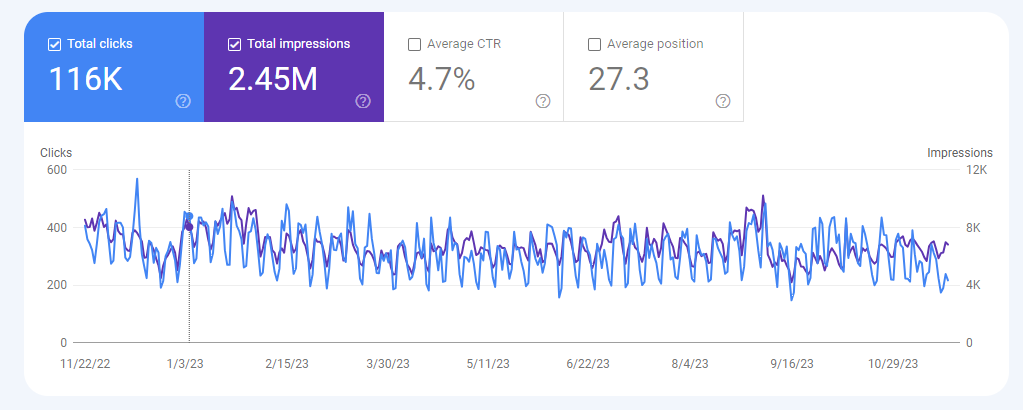
- Queries you rank for
- Clicks/Impressions
- Average UK search position
- Mobile vs. desktop performance
Combine with Google Analytics to assess SEO success tracking users from click down to conversion.
Competitor Analysis
Leverage incognito Google searching and tools like SEMrush and Ahrefs to research the sites outranking you for core UK keywords.
Assess why they rank better by benchmarking against your on-page/off-page metrics using this data to guide strategy.
Analyze analytics to double down on what’s working and rapidly iterate to improve poor areas dragging UK search performance down.
Can I hire an SEO professional to help with all of these?
Yes, you can hire an SEO professional to help with your website’s search engine optimization.
Hiring an SEO specialist can be beneficial for businesses that lack the expertise or resources to manage their SEO strategy effectively.
When considering hiring an SEO professional, it’s important to conduct an interview, request an audit of your site, and ask for references from other clients to ensure you find a promising candidate.
SEO experts can help improve your website’s performance in search results, drive traffic, and ultimately contribute to the growth of your business.
The cost of hiring an SEO expert in the UK can vary depending on the level of expertise and the scope of the project.
According to our research, the cost of hiring an SEO expert in the UK ranges from £35 per hour for a freelancer to £560 per day for an experienced professional.
The cost of an SEO review and implementation can range from £400 to £1,000, while monthly SEO costs can range from £500 to £600.
The cost of SEO services can also be based on hourly rates, one-off project prices, monthly retainer contract prices, or pay-on-performance structures.
Small local SEO packages may run from around £299 to £499 a month, with other common SEO amounts running from £999 to upwards of £10k per month for larger projects.
Key Takeaways
Getting a GoDaddy website ranking high on Google in the UK takes:
- On-page optimization with UK-focused keywords, quality content and site architecture
- Off-page signals like niche backlinks, directory listings and engagement
- Submitting to Google Search Console for insights
- Localizing site design, addresses and content
- Analyzing site analytics to refine strategy
Dedicating effort to understand Google’s UK index can drive significant search visibility and associated qualified website traffic over time.
Monitor progress weekly using available data and outperform the competition!
Read also: